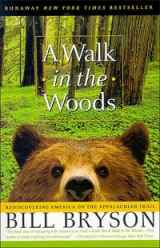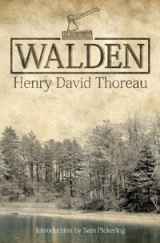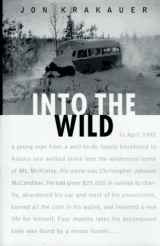The Nature Novel in American Literature
Americans have always had a love affair with “the great outdoors.” From pioneers heading west to people exploring our beautiful national parks today, it seems that no matter how tech-obsessed our current society is, we still have an innate need to connect with the natural world. Enter the nature novel: books that primarily focus on people doing just that. The genre includes a wide variety of literature focusing on different themes. John Krakauer’s Into the Wild details Chris McCandless’s ill-fated foray into the Alaskan wilderness, while Bill Bryson’s A Walk in the Woods is a humorous first-hand account of misadventures on the Appalachian Trail. Rachel Carson’s Silent Spring documents the awful effects of pesticides on the environment and stresses the need for conservation efforts, and Henry David Thoreau’s Walden is a reflection on the experience of living a simpler lifestyle in a natural setting. Clearly, nature-writing encompasses an endless variety of stories. It’s what these stories have in common that influence readers.

Nature novels often incorporate ideas of escapism. Readers who live in suburbs and cities want something other than what they see on their commute to work each morning. Sharing in Bryson’s difficult yet worthwhile hikes through the beautiful Smokey Mountains is a welcome break from the usual routine. “All over America today people would be dragging themselves to work, stuck in traffic jams, wreathed in exhaust smoke. I was going for a walk in the woods. I was ready for this,” Bryson declares. Bryson is a relatable protagonist: before he sets out on the trail, he is thoroughly overwhelmed by the camping section of his local sports store, and feels completely clueless compared to seasoned hikers. Throughout the novel, he recalls the odd characters he and his unlikely hiking partner, Katz, encountered on the trail. Whenever they have the opportunity, the two indulge in amenities that we take for granted, such as enjoying a hot meal, sleeping in a comfortable bed, or taking a hot shower. Bryson delves beyond his own experiences on the trail and discusses both its beauty and the importance of conserving places like this, something that many of us have the luxury of ignoring in our daily lives. It’s a fresh perspective on what’s truly important.
Other firsthand accounts in nature novels may be more serious, but they are no less captivating: in Linda Greenlaw’s The Hungry Ocean, readers are brought along on a harrowing month-long swordfishing trip. Although many nature novels, even those that take on a more positive tone, accurately describe the struggles that one faces away from civilization, they give us a window into a world that’s typically very different from our own. Our usual problems would cease to matter, and we would have to focus on meeting our basic needs-finding water, food, and shelter. This is an eye-opening concept for many Americans.
Nature novels allow us to reminisce on simpler times. Although many recent inventions have certainly made life easier, many feel that our lives have been taken over by technology and social media. They long to disconnect for a while. Short of a camping trip, a nature novel may be the best way to do that. In Walden, Thoreau advocated for spending time alone in nature: “Live in each season as it passes; breathe the air, drink the drink, taste the fruit, and resign yourself to the influence of the earth.” Thoreau spent two years, two months, and two days living near Walden Pond in a small cabin. He was about two miles away from his family home and within a short distance of a nearby town, but he wanted to fully immerse himself in nature during the time he lived there. His experiment was inspired by transcendentalist philosophy, and the novel functions as a declaration of independence from the typical workings of civilization, guidelines to self-reliance, and a discussion of personal spiritual discovery. For a few hours while reading, we get to be hidden away from the world at Walden Pond, in a time before cell phones, computers, and iPods. It’s hard to catch a true moment alone when it seems like everyone has infinite ways of contacting you, but when reading a nature novel, it’s as though you get to enjoy a few hours of peace and solitude away from our technology dependent society.

With the current push towards a more natural lifestyle, it makes sense that Americans would still turn towards nature novels. Many individuals are focused on going green, reducing their carbon footprints, and living sustainably. They want to be in touch with nature and respect the planet and the beautiful creatures that inhabit it. Vegetarianism and veganism are on the rise, and companies who pledge to cut back their carbon emissions and use recycled materials are praised. For those interested in environmental activism, nature novels are both educational and motivational. In Silent Spring, Rachel Carson stated, “The public must decide whether it wishes to continue on the present road, and it can do so only when in full possession of the facts.” This book incited a huge outcry that resulted in the banning of the extremely toxic pesticide DDT. It also led to changes in laws concerning the use of our land, air, and water. This novel was truly revolutionary, and Carson is hailed as one of the most important environmentalists of the twentieth century. Her work in changing our world was indispensable, and she spearheaded positive reform with Silent Spring. Through novels like Silent Spring, the general public learned more about how humanity has negatively impacted the environment, and this newfound knowledge can lead to readers changing their lifestyles in order to help, rather than harm, the environment.

Besides pushing us to live sustainably, nature novels push us to get out and live. We may not want to emulate the protagonists-no one hopes for the same untimely end that Chris McCandless’s quest of Into the Wild resulted in-but the idea of a free spirited life is enthralling. With plenty of money and a college degree, McCandless had the world at his feet, and the general public wondered he would throw it away only to end up dead in a remote area of Alaska. The novel takes a deeper look at McCandless’s risky choices and motivations. He craved life off the grid, wanted to be unencumbered by money and material possessions, and felt at home only when he was roaming in solitude. There’s a certain allure to his journey, even to readers who thoroughly enjoy the comfort of their own homes and don’t daydream about wandering through the wilderness. McCandless always wanted to be exploring off the beaten path, and though he made fatal mistakes, his explanation of his lifestyle in Into the Wild is quite beautiful: “The very basic core of a man’s living spirit is his passion for adventure. The joy of life comes from our encounters with new experiences, and hence there is no greater joy than to have an endlessly changing horizon, for each day to have a new and different sun.” Reading nature novels can fuel the desire to experience more of the world, away from the confines of our comfort zones.
The nature novel is a classic staple of American literature. It will remain so as we further explore our relationship with the environment. Hopefully, these novels will continue to educate and inspire generations of readers, who can take these lessons into the world to make positive changes for the planet.
What do you think? Leave a comment.











Two wonderful recent titles I like in this genre are Swamplandia and Anthill.
A Walk in the Woods is very good read. I recommend trying Jean Giono. I would probably go with Harvest, although Song of the World might also be a good choice.
My favourite book of very long standing in this genre is Gerald Durrell, My Family and Other Animals. It’s sort of much-better-written James Herriot but for nature and fauna instead of animals.
This is a phenomenal list -I’ve just been sitting here paging through them on amazon.
I’d especially recommend Sometimes a Great Notion. It’s one of the best books I’ve ever read, though I admittedly did have a couple of false starts. The opening passage on the birth of a river is one of the most evocative pieces of writing about nature I’ve ever read, fiction or non-.
For newer material, I suggest checking out Anthony Doerr. I read the Shell Collector. His language is gorgeous.
Great topic. I remember reading “My Side of the Mountain” and “Hatchet” when I was younger, and I especially remember the way they made me feel while reading them. Being alone in the woods can be either a beautiful or treacherous activity.
Almost anything by Rick Bass really. Love his short stories.
I’ve read Into the Wild more than once. Great article. I recommend Barbara Kingsolver, who, while not being strictly a “nature writer” per se, uses naturalistic imagery and motifs in her fiction. Prodigal Summer is a fave, as is The Bean Trees.
James Fenimore Cooper, the Leatherstocking novels. All men should read.
I honestly want to read all of the novels you’ve listed here! I’m only familiar with Into the Wild. The nature novel real is an important part of our culture, and I thank you for sharing.
I’ve never read any nature novels myself. But this article has got me interested! I hadn’t really thought of it as part of culture. Thanks!
Reading a nature novel is just what we need in our technologically advanced age. A good way to really “recharge” the human mind naturally.
Good article. Why didn’t you include Jack London in this list?
So true – the list goes on and on and there is an innate draw for humans to get out and explore. Important to treat the world with respect for all it gives us.
This article instantly had me grabbed when right off the bat the author spoke about Into the Wild and Walden, two novels that I have a strong love for and the connection between the two can only be described as uncanny. I am very interested in Bryson’s novel while reading this article and think the excerpt from the book that is provided is a perfect outlook on today and the desires that Americans to have to just say “screw it”, go into the wild and live off nothing but the necessities of life. This author does an amazing job of connecting these authors and their novels to each other, great article!
This is a very well-written and relevant article. Reading books like “Walden” can be exactly what some people need to make that transition, even if it’s just to going a little bit greener or finally going for an overnight hike, or whatever. Somehow each of us can have our own personal reactions to nature books, whether fiction or nonfiction. Somehow they can help us appreciate the everyday parts of nature we see everyday, from trees to sunshine. It’s all about seeing the beauty in the otherwise mundane!
There are quite a few literary pieces that could be included. Last of the Mohicans comes to mind.